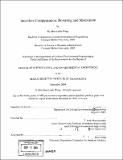Incentive compensation : bonusing and motivation
Author(s)
Wang, Shun Linda, 1980-
DownloadFull printable version (2.791Mb)
Other Contributors
Massachusetts Institute of Technology. Dept. of Civil and Environmental Engineering.
Advisor
Fred Moavenzadeh.
Terms of use
Metadata
Show full item recordAbstract
Management is often frustrated by the lack of motivation generated by end of the year bonuses. Currently, there are two compensation ideals, merit-based versus incentive-based. Merit based compensation correlates compensation to one's job performance, whereas incentive based on set goals and correlates bonus rewards before the time frame used to evaluate the performance. An effective incentive program contributes to a company's overall competitiveness by encouraging superior performance as well as improving the company's earning and cash flow. An incentive compensation program is not a substitute for lack of staff accountability, rather it should be used to motivate individuals and align the goals of individuals with those of the company. The purpose of this study is three-fold. First to determine current incentive package in A/E/C firms and comparing them with other industries' compensation. Second, research how more fitting incentive packages will help to make the industry more efficient, and transform the industry to a non-zero sum situation for all parties. Lastly, determine factors needed to have a complete incentive package, as well as explore possible ways of implementation of the incentive programs. In conclusion, not all A/E/C firms will benefit from incentive programs, but those that are in certain fields of the industry will see an increase in productivity and overall competitiveness of the firm.
Description
Thesis (S.M.)--Massachusetts Institute of Technology, Dept. of Civil and Environmental Engineering, 2004. Includes bibliographical references (leaves 79-81).
Date issued
2004Department
Massachusetts Institute of Technology. Department of Civil and Environmental EngineeringPublisher
Massachusetts Institute of Technology
Keywords
Civil and Environmental Engineering.